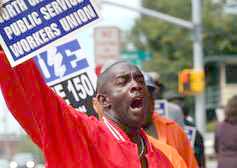Raleigh, N.C., sanitation workers’ struggle heats up
“What do we want? Justice! What do we want? Collective Bargaining!” chanted more than 100 sanitation workers and supporters in front of Raleigh’s City Hall on Sept. 25, in response to City Manager Russell Allen’s inadequate response to their demands. The workers had gone back to work in good faith after their wildcat strikes the previous week, and had given the city until Sept. 22 to meet their demands.
 protest at Raleigh City Hall. " border="1"> protest at Raleigh City Hall. " border="1"> Leo Brown, sanitation worker, at Sept. 25 protest at Raleigh City Hall. Photo: Takaaki Iwabu |
The issue underlying the struggle is serious understaffing across the city. On Sept. 19, workers made a strong presence at the City Council meeting, where the council motioned to retain six positions they had deleted in an earlier meeting and add six new positions. However, there was no mention of the 20 positions the bosses have kept unfilled.
Allen mentioned that he has given authority to the bosses to pay overtime pay; yet this leaves discretion in their hands. The workers need written confirmation that they will be given time-and-a-half pay as a permanent policy, and that working over 10 hours of overtime will be voluntary, not forced.
Workers have been getting paid for overtime only with compensation time, which legally can only be accrued up to 70 hours, after which time-and-a-half pay must be given. This practice has clearly been violated. The bosses do not keep track of workers’ hours and pay all workers for 40 hours every week. Workers recently filed for a written record of hours worked, knowing no such records exist.
Workers also demanded the right to collectively bargain. They have been organizing and over three-quarters of the sanitation plant workers are now signed up with UE Local 150, the N.C. Public Sector Workers Union. In response, Mayor Charles Meeker said he wanted to establish “meet and confer” practices—a step between no recognition and collective bargaining—with the workers.
Allen promised to be at the plant on Sept. 22 to meet with workers, but when he showed up he refused to meet with any of the workers in the union. He left the meeting having addressed very few of the demands.
“[Allen] did not guarantee that we would not be forced to work overtime, nor did he make any promises about paying us for our overtime work. … He has no respect for us or the union,” said John T. McNeill, UE 150 member and sanitation worker. “It was a disaster,” says union-meet-and-confer committee member and sanitation worker Jerry Ledbetter. “Normally I do not call out racism, but he was plain racist.”
Later at the union meeting, workers gave Allen a vote of no confidence and are currently seeking to meet and confer with the mayor.
The South and the movement for collective bargaining rights
Sanitation workers in Raleigh say that they wouldn’t have struck had they been given the dignity and respect of city management through collective bargaining. The same has been said throughout North Carolina by the International Workers Justice Campaign.
The campaign is organized by UE Local 105 and Black Workers for Justice to bring international attention to the working conditions created in an environment without collective bargaining rights, and to repeal North Carolina General Statute 95-98, which makes collective bargaining illegal for public employees.
Workers, mostly UE members, spoke out in public hearings over the last year in Greensboro, Goldsboro, Rocky Mount, Durham, Chapel Hill, Raleigh and Charlotte. This culminated in a statewide hearing where members of the United Nations’ International Labor Rights Commission from South Africa, Nigeria, Sweden, Mexico, Japan, Quebec, and India listened to workers’ demands. The ILRC prepared a 90-page report that was delivered by UE activists to members of the N.C. General Assembly. Thousands of petitions were also delivered to Governor Michael Easley.
This entire struggle must be considered in the context of right-to-work laws, runaway shops, deindustrialization, and all working conditions in the U.S. South. Until last year—when the Farm Labor Organizing Committee signed a contract covering 7,000 migrant workers—North Carolina was the least unionized state in the country, with less than 2 percent of workers having union representation. Now it is second worst, only ahead of South Carolina.
Because of NC 95-98, North Carolina is the only state in the country where it is illegal to collectively bargain. It was written in 1959 in response to Jimmy Hoffa’s announcement that he would lead the Teamsters Union in an effort to organize 10 million public workers. Eleven other mostly Southern states do not have laws protecting collective bargaining rights.
Striking is illegal in North Carolina, but the laws cannot be taken out of the context of workers’ power. Workers are continuing to organize and fight for their demands.
“Unions have been needed here for a long time. … Now we are standing up and fighting for justice,” said Ledbetter.
The writer is a member of the FIST youth group and the UE 150 staff.


<< Home